|
Books Should Be Free Loyal Books Free Public Domain Audiobooks & eBook Downloads |
|
|
Books Should Be Free Loyal Books Free Public Domain Audiobooks & eBook Downloads |
|
Philosophy Books |
|---|
|
Book type:
Sort by:
View by:
|
By: Henry Drummond | |
|---|---|
 The Greatest Thing in the World and Other Addresses
The Greatest Thing in the World and Other Addresses
The spiritual classic The Greatest Thing In the World is a trenchant and tender analysis of Christian love as set forth in the thirteenth chapter of I Corinthians. The other addresses speak to other aspects of Christian life and thought. | |
 Addresses
Addresses
| |
By: Henry F. (Henry Frey) Lutz | |
|---|---|
 To Infidelity and Back
To Infidelity and Back
| |
By: Henry Frederick Cope (1870-1923) | |
|---|---|
 Levels of Living Essays on Everyday Ideals
Levels of Living Essays on Everyday Ideals
| |
By: Henry L. Mencken (1880-1956) | |
|---|---|
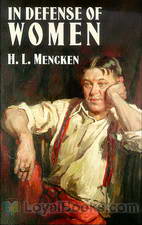 In Defense of Women
In Defense of Women
In Defense of Women is H. L. Mencken’s 1918 book on women and the relationship between the sexes. Some laud the book as progressive while others brand it as reactionary. While Mencken didn’t champion women’s rights, he described women as wiser in many novel and observable ways, while demeaning average men. According to Mencken’s biographer, Fred Hobson: Depending on the position of the reader, he was either a great defender of women’s rights or, as a critic labelled him in 1916, ‘the greatest misogynist since Schopenhauer’,'the country’s high-priest of woman-haters.’ | |
By: Henry Longueville Mansel (1820-1871) | |
|---|---|
 The Philosophy of the Conditioned
The Philosophy of the Conditioned
| |
By: Henry More (1614-1687) | |
|---|---|
 Democritus Platonissans
Democritus Platonissans
| |
By: Herbert Spencer (1820-1903) | |
|---|---|
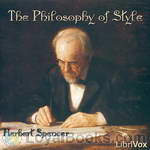 The Philosophy of Style
The Philosophy of Style
“The Philosophy of Style,” explored a growing trend of formalist approaches to writing. Highly focused on the proper placement and ordering of the parts of an English sentence, [Spencer] created a guide for effective composition. Spencer’s aim was to free prose writing from as much “friction and inertia” as possible, so that the reader would not be slowed by strenuous deliberations concerning the proper context and meaning of a sentence. | |
 Essays: Scientific, Political, & Speculative, Vol. I
Essays: Scientific, Political, & Speculative, Vol. I
| |
By: Hugh Black (1868-1953) | |
|---|---|
 Friendship
Friendship
The idea, so common in the ancient writers, is not all a poetic conceit, that the soul of a man is only a fragment of a larger whole, and goes out in search of other souls in which it will find its true completion. We walk among worlds unrealized, until we have learned the secret of love. We know this, and in our sincerest moments admit this, even though we are seeking to fill up our lives with other ambitions and other hopes. In spite of the vulgar materialism of our day, we do feel that the spiritual side of life is the most important, and brings the only true joy... | |
By: Immanuel Kant (1724-1804) | |
|---|---|
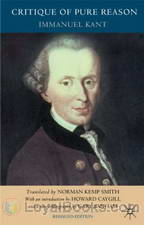 The Critique of Pure Reason
The Critique of Pure Reason
The Critique of Pure Reason, first published in 1781 with a second edition in 1787, has been called the most influential and important philosophical text of the modern age. Kant saw the Critique of Pure Reason as an attempt to bridge the gap between rationalism (there are significant ways in which our concepts and knowledge are gained independently of sense experience) and empiricism (sense experience is the ultimate source of all our concepts and knowledge) and, in particular, to counter the radical empiricism of David Hume (our beliefs are purely the result of accumulated habits, developed in response to accumulated sense experiences)... | |
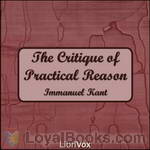 The Critique of Practical Reason
The Critique of Practical Reason
The Critique of Practical Reason (Kritik der praktischen Vernunft) is the second of Immanuel Kant’s three critiques, first published in 1788. It follows on from his Critique of Pure Reason and deals with his moral philosophy. The second Critique exercised a decisive influence over the subsequent development of the field of ethics and moral philosophy, becoming the principle reference point for ethical systems that focus on the rightness or wrongness of actions themselves, as opposed to the rightness or wrongness of the consequences of those actions... | |
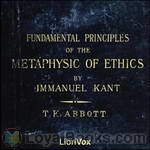 Fundamental Principles of the Metaphysic of Morals
Fundamental Principles of the Metaphysic of Morals
The Fundamental Principles of the Metaphysic of Morals, also known as The Groundwork of the Metaphysics of Morals or Foundations of the Metaphysics of Morals or Grounding of the Metaphysics of Morals, is Immanuel Kant's first contribution to moral philosophy. It argues for an a priori basis for morality. Where the Critique of Pure Reason laid out Kant's metaphysical and epistemological ideas, this relatively short, primarily meta-ethical, work was intended to outline and define the concepts and arguments shaping his future work The Metaphysics of Morals. However, the latter work is much less readable than the Fundamental Principles. | |
 The Metaphysical Elements of Ethics
The Metaphysical Elements of Ethics
| |
By: Inazo Nitobe (1862-1933) | |
|---|---|
 Bushido: The Soul of Japan
Bushido: The Soul of Japan
Bushido: The Soul of Japan written by Inazo Nitobe was one of the first books on samurai ethics that was originally written in English for a Western audience, and has been subsequently translated into many other languages (also Japanese). Nitobe found in Bushido, the Way of the Warrior, the sources of the virtues most admired by his people: rectitude, courage, benevolence, politeness, sincerity, honor, loyalty and self-control, and he uses his deep knowledge of Western culture to draw comparisons with Medieval Chivalry, Philosophy, and Christianity. | |
By: Isaac Barrow (1630-1677) | |
|---|---|
 Sermons on Evil-Speaking
Sermons on Evil-Speaking
| |
By: Isaac Husik (1876-1939) | |
|---|---|
 A History of Mediaeval Jewish Philosophy
A History of Mediaeval Jewish Philosophy
| |
By: J Hudson Taylor (1832-1905) | |
|---|---|
 Union and Communion - or Thoughts on the Song of Solomon
Union and Communion - or Thoughts on the Song of Solomon
This little book, whose design is to lead the devout Bible student into the Green Pastures of the Good Shepherd, thence to the Banqueting House of the King, and thence to the service of the Vineyard, is one of the abiding legacies of Mr. Hudson Taylor to the Church. In the power of an evident unction from the Holy One, he has been enabled herein to unfold in simplest language the deep truth of the believer's personal union with the Lord, which under symbol and imagery is the subject of The Song of Songs. (From the Foreword by J Stuart Holden). | |
By: J. Cameron (James Cameron) Lees (1834-1913) | |
|---|---|
 Life and Conduct
Life and Conduct
| |
By: J. M. (John Mackinnon) Robertson (1856-1933) | |
|---|---|
 Montaigne and Shakspere
Montaigne and Shakspere
| |
By: J. M. Judy | |
|---|---|
 Questionable Amusements and Worthy Substitutes
Questionable Amusements and Worthy Substitutes
| |
By: James Allen (1864-1912) | |
|---|---|
 As a Man Thinketh
As a Man Thinketh
“A man is literally what he thinks, his character being the complete sum of all his thoughts,” is one of the quotes from James Allen's classic self help books, As a Man Thinketh. Published in 1902, it provides many more such insightful concepts on the power of thought and its effect on a human being's personality and behavior. This volume is more of a literary essay than a complete book and its title is based on a Biblical proverb, “As a man thinketh in his heart, so is he.” Taking this piece of ancient wisdom further, James Allen explores the far-reaching effects of the inner workings of a person's mind and motivation... | |
 The Way of Peace
The Way of Peace
The Way of Peace is your guide to the power of meditation; self and truth; the acquirement of spiritual power; the realization of selfless love; entering into the infinite; saints, sages, and saviors; the law of service; and the realization of perfect peace. | |
By: James Cardinal Gibbons (1834-1921) | |
|---|---|
 The Faith of Our Fathers
The Faith of Our Fathers
The Faith of Our Fathers: A Plain Exposition and Vindication of the Church Founded by Our Lord Jesus Christ is a book published in 1876 by archbishop James Gibbons, which became a best-selling conversion manual in the United States, and by 1980 was in its 111th printing.(From the preface) “The object of this little volume is to present in a plain and practical form an exposition and vindication of the principal tenets of the Catholic Church. It was thought sufficient to devote but a brief space to such Catholic doctrines and practices as are happily admitted by Protestants, while those that are controverted by them are more elaborately elucidated... | |
By: James Hayden Tufts (1862-1942) | |
|---|---|
 The Ethics of Coöperation
The Ethics of Coöperation
| |
By: Jane Ellen Harrison (1850-1928) | |
|---|---|
 Ancient Art and Ritual
Ancient Art and Ritual
| |
By: Jean-Jacques Rousseau (1712-1778) | |
|---|---|
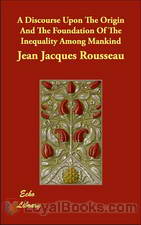 A Discourse Upon the Origin and the Foundation of the Inequality Among Mankind
A Discourse Upon the Origin and the Foundation of the Inequality Among Mankind
This work presents Rousseau’s belief in the profoundly transformational effects of the development of civilization on human nature, which Rousseau claims other political philosophers had failed to grasp. Specifically, before the onset of civilization, according to Rousseau, natural man lived a contented, solitary life, naturally good and happy. It is only with the onset of civilization, Rousseau claims, that humans become social beings, and, concomitant with their civilization, natural man becomes corrupted with the social vices of pride, vanity, greed and servility. | |
By: Jesse Lynch Williams (1871-1929) | |
|---|---|
 Why Marry?
Why Marry?
Why Marry? is a comedy, which "tells the truth about marriage". We find a family in the throes of proving the morality of marriage to a New Age Woman. Can the family defend marriage to this self-supporting girl? Will she be convinced that marriage is the ultimate sacredness of a relationship or will she hold to her perception that marriage is the basis of separating two lovers."Why Marry?" won the first Pulitzer Prize for Drama. | |
By: Joel Chandler Harris (1848-1908) | |
|---|---|
 Uncle Remus
Uncle Remus
Bearing a striking resemblance to Aesop of Aesop's Fables fame, American author Joel Chandler Harris' Uncle Remus is also a former slave who loves to tell simple and pithy stories. Uncle Remus or to give it its original title, Uncle Remus: His Songs and His Sayings was published in late 1880 and received instant acclaim. The book was reviewed in hundreds of journals and newspapers across the country, leading to its immense success, both critical and financial. “Remus” was originally a fictional character in a newspaper column... | |
By: Johannes Henricus Scholten (1811-1885) | |
|---|---|
 A Comparative View of Religions
A Comparative View of Religions
| |
By: John Abercrombie (1780-1844) | |
|---|---|
 The Philosophy of the Moral Feelings
The Philosophy of the Moral Feelings
| |
By: John Alexander Gunn (1896-1975) | |
|---|---|
 Modern French Philosophy: a Study of the Development Since Comte
Modern French Philosophy: a Study of the Development Since Comte
| |